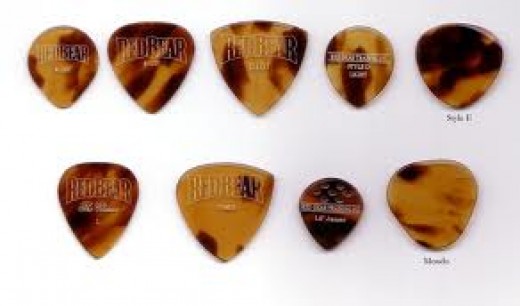The Hawksbill Sea Tortoise, and Faux Tortoise Shell Picks


Picks for Acoustic Guitars, The Right One MATTERS
The
acoustic guitar is traditionally an un amplified instrument, and even
if one features a pre - amp and pickup for amplification, the importance
of using the right sort of plectrum or pick can not be overstated. I
write a lot here about high end, high quality acoustic guitars; but
spending a thousand dollars or more for a great acoustic guitar, and
then playing it with a .10 cent Fender thin pick or plectrum completely
defeats the purpose of having purchased such a great instrument. If
you're going to play an acoustic steel string guitar with a Fender thin
pick or plectrum, then you shouldn't have wasted your money on a great
sounding guitar because you will get no great sound out of the
instrument with such a pick.
Originally, the guitar was thought of as a rhythm or backup instrument, and chords were strummed on it behind a soloist playing the violin or the mandolin; and this was all well and good and made for some wonderful music. The guitar, however, always had the capabilities and possibilities that today are well known to be limitless. I think most everyone can agree that melodies either fingerpicked or played with a plectrum are altogether some of the most beautiful sounds that one can hear. But the acoustic guitar is not a loud instrument on it's own, it pales in comparison to a fiddle or violin's ability to produce loud, clear, soaring notes. It doesn't compare to the mandolin or the banjo, or any other stringed instrument in ability to be both loud and clear either. Playing solos or melodies on the acoustic guitar without amplification takes some real work, skill, and effort; and the right kind of pick.
Originally, the guitar was thought of as a rhythm or backup instrument, and chords were strummed on it behind a soloist playing the violin or the mandolin; and this was all well and good and made for some wonderful music. The guitar, however, always had the capabilities and possibilities that today are well known to be limitless. I think most everyone can agree that melodies either fingerpicked or played with a plectrum are altogether some of the most beautiful sounds that one can hear. But the acoustic guitar is not a loud instrument on it's own, it pales in comparison to a fiddle or violin's ability to produce loud, clear, soaring notes. It doesn't compare to the mandolin or the banjo, or any other stringed instrument in ability to be both loud and clear either. Playing solos or melodies on the acoustic guitar without amplification takes some real work, skill, and effort; and the right kind of pick.
Tortoise Shell Picks
In
the mid-to-late 19th century there was a high demand for items made
from the shell of the sea-going Hawksbill Turtle. It's shell had
proerties that made it very desirable to the touch. It was warm and
comfortable. It just plain "felt good" to the touch. It was immune to
static charge. That's why so many items made from it were items that
were held close to the body. Ladies' hair combs, knitting needles and
fountain pens were but a few of these items made from the shell of the
hawksbill turtle. The problem was that the shell material was difficult
to come by and therefore very expensive. An alternative was sought out.
Now, I shouldn't have to say this, but killing a beautiful sea tortoise for me to have an awesome guitar pick isn't really cool, and it never was cool. At the same time, I do have to admit that I have more than one of them, that they are simply outstanding, and have physical characteristics unlike any synthetic material that seeks to imitate them. I believe that it has to do with the density of the material, and if I were to hold up one of my tortoise shell picks, and drop it onto a hard surface, it makes a peculiar sound, and you'll not find another pick or material that makes the same sort of sound. You'll also never find another material that produces such a beautiful sound when played on a steel string acoustic guitar. It is what it is, and it's illegal to sell these things. I have some, they are not for sale. I've even had one of my tortoise shell picks STOLEN before. Why? They sell for around $50.00 to $100.00 a piece, but as I said, that's an item that is legal to own, but illegal to sell. If you want to buy one, you have to get it for free, and leave a nice large tip towards the giver's health and happiness; it's just that easy.
If you look at the picks in the picture above, those ARE NOT tortoise shell picks, they only look like them. Fake tortoise material is everywhere, and is practically universal on acoustic guitars as the pickguard under the soundhole. That's just plastic unless you've found a really old Martin or Gibson; and you'd be a damned fool to take the pickguard off of one of those to make it into picks. What the picture up above IS is a synthetic material that not only looks like tortoise shell, but is supposed to sound like tortoise shell as well. I've got LOTS of guitar picks, and I've got a lot of picks made from "tortex," and though those don't really sound like tortoise shell to me, they are very, very good picks.
Now, I shouldn't have to say this, but killing a beautiful sea tortoise for me to have an awesome guitar pick isn't really cool, and it never was cool. At the same time, I do have to admit that I have more than one of them, that they are simply outstanding, and have physical characteristics unlike any synthetic material that seeks to imitate them. I believe that it has to do with the density of the material, and if I were to hold up one of my tortoise shell picks, and drop it onto a hard surface, it makes a peculiar sound, and you'll not find another pick or material that makes the same sort of sound. You'll also never find another material that produces such a beautiful sound when played on a steel string acoustic guitar. It is what it is, and it's illegal to sell these things. I have some, they are not for sale. I've even had one of my tortoise shell picks STOLEN before. Why? They sell for around $50.00 to $100.00 a piece, but as I said, that's an item that is legal to own, but illegal to sell. If you want to buy one, you have to get it for free, and leave a nice large tip towards the giver's health and happiness; it's just that easy.
If you look at the picks in the picture above, those ARE NOT tortoise shell picks, they only look like them. Fake tortoise material is everywhere, and is practically universal on acoustic guitars as the pickguard under the soundhole. That's just plastic unless you've found a really old Martin or Gibson; and you'd be a damned fool to take the pickguard off of one of those to make it into picks. What the picture up above IS is a synthetic material that not only looks like tortoise shell, but is supposed to sound like tortoise shell as well. I've got LOTS of guitar picks, and I've got a lot of picks made from "tortex," and though those don't really sound like tortoise shell to me, they are very, very good picks.
What Else?
The
point of this whole article is to stress that you can't get a good tone
from an acoustic guitar with a thin, or even a medium pick; you've got
to have a stiff, or heavy pick to get a good, loud, clear tone from an
un amplified acoustic. Thin guitar picks are for electric guitars, and
even with an amplified acoustic guitar, they make a pretty awful sound.
Besides tortex, or tortoise shell picks, any good stiff plastic or
synthetic material will do. I've got picks made out of elephant ivory,
again; such things can not be sold legally; and it was never cool to
kill an elephant for picks, nuts, saddles, or bridge pins - I have that
stuff, and it's great for what it does, produce an amazing tone; but I
don't advocate buying or selling it. There's lots of other bone material
that is used nowadays, and it's just as good as ivory. So if you play
acoustic guitar, get a stiff pick!


 4:24 PM
4:24 PM
 Wesman Todd Shaw
Wesman Todd Shaw

0 comments:
Post a Comment